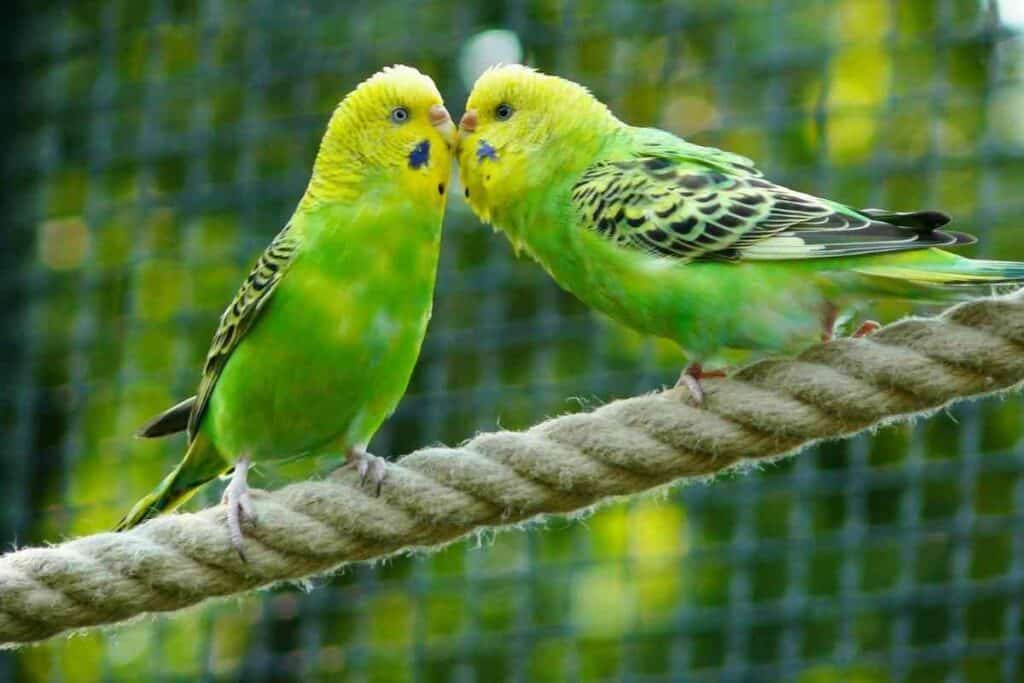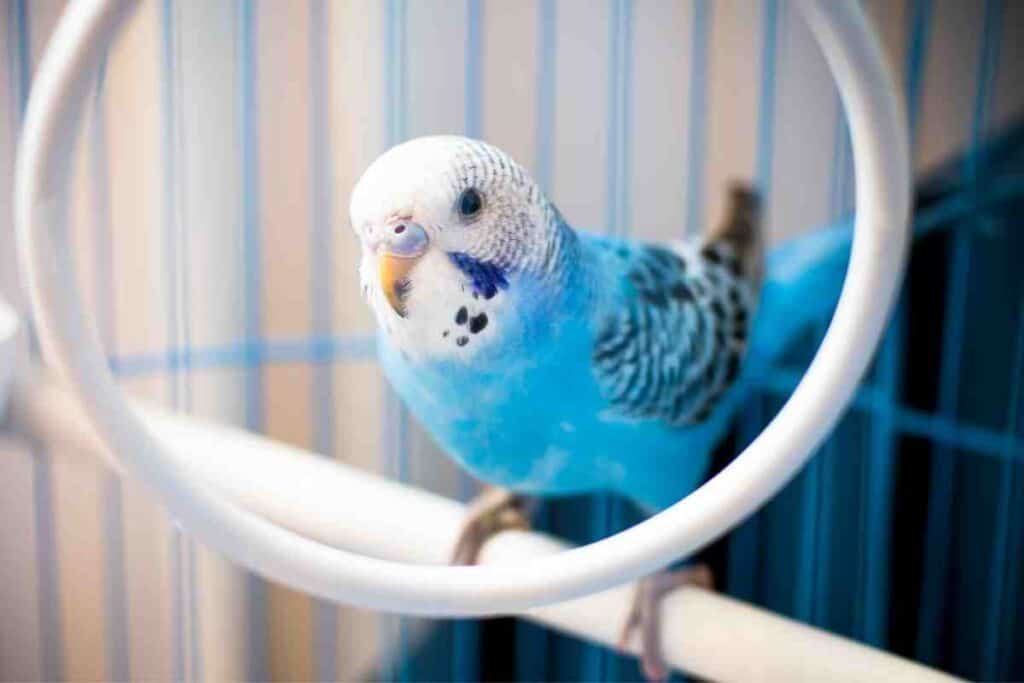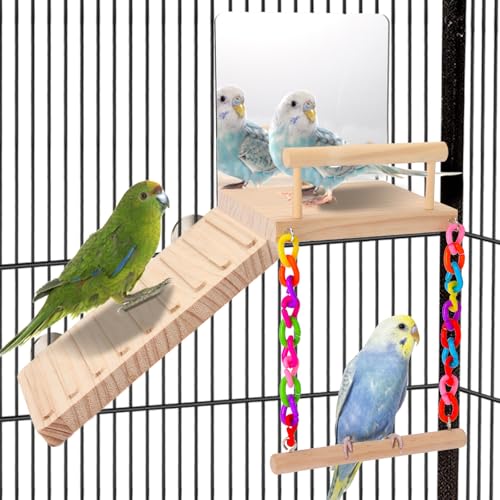Will a Parakeet Die of Loneliness? (Explained!)
Parakeets, also called “budgies,” are one of the most popular pets in the U.S. after dogs and cats. They are small, brightly colored, and can have extremely friendly and fun personalities. First-time parakeet owners often wonder if getting just one bird will lead to loneliness and, if so, how serious of a problem it is. Read on to find out more about this topic.
Will a Parakeet Die of Loneliness?
Yes, a parakeet will die of loneliness if its basic social needs are not met. If someone is keeping a single parakeet as a pet and does not get a second one as a companion, the human will need to fill in otherwise, usually by being available to keep the bird company themselves for multiple hours per day.
Many social animals are at risk of serious mental and physical consequences if they are deprived of interaction with a fellow member of their species or, at least, a good proxy from another species. People who are subject to long periods of solitary confinement, for example, will frequently exhibit signs of severe mental deterioration.
Pets struggle with loneliness and isolation too. A parakeet that is consistently deprived of interaction and stimulation may lapse into poor health and could even die as a result.
Do Parakeets Get Lonely?
Yes, parakeets do get lonely. They have evolved to live in groups and naturally crave socialization, communication, and bonding.
Parakeets originate from Australia, where they live in flocks of as few as three or as many as hundreds. They are naturally chatty birds; an overly quiet parakeet is a parakeet with a problem as this might be a sign of depression or other illness.
In the wild, parakeets depend on traveling in numbers for safety, finding food and water, grooming, and reproduction. As a consequence, they are biologically hardwired to be social; long stretches of alone time can, therefore, become quite damaging.
Is It Better to Have Two Parakeets?
Yes, it is better to have two parakeets as opposed to one. There is no true maximum on the number you can have except for the limits imposed by the amount of space and care you need for each. It is easiest to keep a parakeet healthy and happy with a companion bird unless you are willing to put in the time and dedication needed to take its place.
A human pet owner can sometimes take the place of a parakeet friend if they are willing to commit. There are other steps you can take to make them feel less alone, but there is one big downside to finding an alternative to another parakeet: grooming.
Parakeets groom one another frequently. This is not just a social exercise; it actually helps keep the birds clean and free from harmful skin conditions. A single parakeet may not be able to groom itself sufficiently and could become sick and die if a skin condition or mite infestation were to get out of control.

Can 2 Male Parakeets Live Together?
Yes. Two male parakeets can live together typically without issue. They will most likely bond, groom one another, and overall keep each other company. In the wild, parakeet flocks are composed of males and females, so there is no particular reason for them not to get along although all animals are individuals.
Parakeets are not like some animals where male rivalry is such a big problem that you cannot keep them together. Even if you kept a female in with two males, they may all still get along just fine. Wild female parakeets are likely to mate with multiple males so the same pressure from competition does not exist as with other species.
If for some reason, your parakeets are not getting along, you can separate them into different cages but keep them next to each other. That way, they can socialize safely until you feel that they can spend time together again. When reintroducing birds that live separately, you should supervise their visits until you feel confident that they no longer need supervision.
What Do I I Do if My Parakeet Gets Lonely or Bored?
There are several actions you can take to alleviate your parakeet’s loneliness or boredom. Getting them another parakeet friend is one of the best things you can do for their physical and mental health. You can also spend a copious amount of time with them yourself and vary the kinds of stimuli your parakeet is exposed to day-to-day.
Getting Another Parakeet
As mentioned, the best thing you can do to keep your parakeet healthy and happy is to get them a friend of the same species. While not strictly necessary, this will take a lot of the work, worry, and creative problem-solving off your shoulders when it comes to managing your parakeet’s well-being.
The reason why a parakeet owner might not want to get two parakeets at the same time is that they are hoping to strongly bond with their parakeet themselves. One way to get around this might be to get one parakeet first and invest a lot of time into bonding with it and, if you want, teaching it to talk before getting another and then introducing them.
Getting two or more together right away will make it somewhat harder to bond very closely with a parakeet because they will bond with each other first. They will be most interested in talking with each other and will thus be less likely to learn human words.
Bonding with Your Bird
You, the human, can provide a parakeet with a fulfilling relationship that keeps them happy but not if you can only spare a small amount of time for them. Seeing them briefly each morning and evening, working them around a hectic work and life schedule, will not be sufficient to maintain good mental health.
If you are aiming to be your parakeet’s sole bosom buddy, it would be ideal if you were retired or worked from home, etc. It would also be useful if you didn’t mind spending a lot of time in their presence and entertaining them. If you enjoy being around them for multiple hours per day, playing with them, listening to them chatter, and talking with them, then you could make a great friend for your parakeet!

A Different Species Companion
Another alternative to getting another parakeet or spending a lot of time at home with your one is keeping them company with a bird of a different species. Another parrot or vocal bird nearby may interact with your parakeet and help them feel less lonely, even if they are not able to perfectly communicate with each other.
Exposure to the Outdoors and Wild Birds
Opening a window or taking your parakeet’s cage outside for short periods represents additional enrichment tools in your toolbelt. Like all of us, parakeets will benefit from the sunshine and fresh air. Beyond that, your parakeet will be able to listen to and possibly vocalize back and forth with wild birds. This will help satisfy some of their instincts to be with other birds although it is not quite as good as having a friend living with them.
Leave the Radio On
Parakeets are designed for constant noise – making it and hearing it from fellow parakeets. Some people try to recreate this by playing recordings of parakeet sounds to them but unfortunately, this actually upsets them, possibly because they try to communicate with the sounds, but the recordings do not respond in kind. As a result, the bird becomes confused and frustrated.
A better option is to leave a radio on for them when they have to be alone during the day (at night, they should have quiet so they can sleep!). The variety of sounds from a not-too-loud radio will keep their mind active and help them be less bored.
Flying Time
A parakeet can become depressed even if they do have friends. Contributing factors include living in too small a cage and coping with an unchanging environment. Designating a safe room in your house where you can allow your bird out sometimes will greatly benefit them as they will get to explore, stretch, and exercise.
Parakeets are birds so of course having the chance to fly about is an excellent source of mental and physical stimulation for them. If you find that they are flying a bit too erratically and uncontrollably, you can have their wings clipped to limit how fast and how far they can fly.
Toys and Entertainment
Being a type of parrot, parakeets are accordingly intelligent. One way that we know they are intelligent is because they love to play. Smart pets can be more difficult to care for because they desire novel experiences and can become bored quite easily. For this reason, giving parakeets toys is a popular option for parakeet owners.
You may want to place the toys in the cage with them or out in whatever space you deem safe for outside-of-the-cage time or both! Either way, it is better to rotate which toys they get to play with now and then since they can become bored with the same toys all the time too.
Conclusion
Next to other parrots, parakeets are relatively easy to care for and are even considered good “beginner” pets by some. The major caveat is you must be diligent in preventing loneliness because they can suffer and die from it. Giving them parakeet friends is best but as long as you fully provide for their needs in other ways, it is possible to ensure your parakeet lives a long, happy life full of friendship.



